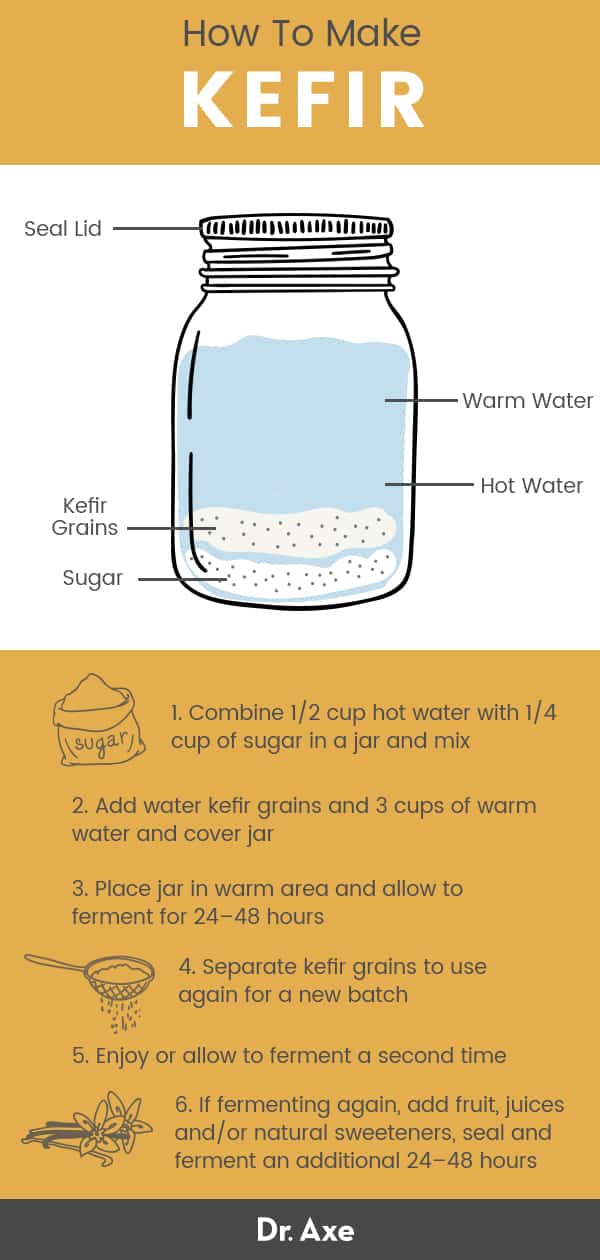This Dr. Axe content is medically reviewed or fact checked to ensure factually accurate information.
With strict editorial sourcing guidelines, we only link to academic research institutions, reputable media sites and, when research is available, medically peer-reviewed studies. Note that the numbers in parentheses (1, 2, etc.) are clickable links to these studies.
The information in our articles is NOT intended to replace a one-on-one relationship with a qualified health care professional and is not intended as medical advice.
This article is based on scientific evidence, written by experts and fact checked by our trained editorial staff. Note that the numbers in parentheses (1, 2, etc.) are clickable links to medically peer-reviewed studies.
Our team includes licensed nutritionists and dietitians, certified health education specialists, as well as certified strength and conditioning specialists, personal trainers and corrective exercise specialists. Our team aims to be not only thorough with its research, but also objective and unbiased.
The information in our articles is NOT intended to replace a one-on-one relationship with a qualified health care professional and is not intended as medical advice.
Water Kefir: Can This Probiotic Powerhouse Really Boost Health?
December 20, 2018

Water kefir is a fermented, fizzy drink that has become a fast favorite among health-conscious consumers, all thanks to its delicious flavor, extensive nutrient profile and gut-boosting benefits. Plus, it’s often selected over other probiotic-rich foods like milk or coconut kefir because it’s dairy-free, vegan-friendly and easy to prepare at home from the comfort of your own kitchen.
So what are the health benefits of water kefir, and what does kefir do for you? Here’s what you need to know.
What Is Water Kefir?
Water kefir is a fermented beverage that is made by adding kefir grains to sugar water. This mixture is then left to ferment for 24–48 hours. This helps create a fizzy, probiotic-rich beverage that’s brimming with benefits.
Although traditional kefir is made using the milk of cows, sheep or goats, water kefir is often preferred by those looking to minimize their consumption of animal products while still reaping the rewards of this incredible ingredient. Because it’s also thinner than traditional kefir, it can be flavored using fruit, veggies, herbs or spices and enjoyed in place of higher-calorie beverages like soda or juice.
In addition to cutting calories to aid in weight loss, this type of kefir can also bump up immune function, help fight off cancer cells and optimize gut health to keep you feeling your best. Plus, it’s delicious, easy to enjoy and can be made at home using just a few simple ingredients.
Related: Probiotic Drink Benefits, Plus How to Make Your Own
Nutrition Facts
Water kefir is low in calories but high in probiotics, including a wide array of beneficial strains of bacteria. In fact, a study published in Frontiers in Microbiology showed that kefir water is one of the best dietary sources of probiotics available and may contain up to 56 different strains of yeast and bacteria.
In particular, water kefir is a great source of several of the best probiotic strains, including:
- Lactobacillus delbrueckii subsp. bulgaricus
- Lactobacillus helveticus
- Lactobacillus kefiranofaciens subsp. kefiranofaciens
- Lactobacillus kefiranofaciens subsp. kefirgranum
- Lactobacillus acidophilus
- Lactococcus lactis subsp. lactis
- Lactococcus lactis subsp. cremoris
- Streptococcus thermophilus
- Leuconostoc mesenteroides subsp. cremoris
- Leuconostoc mesenteroides subsp. mesenteroides
Health Benefits
1. Boosts Gut Health
Water kefir is rich in probiotics. Probiotics are beneficial bacteria that can help support gut health. Studies show that probiotics can have far-reaching effects on health. In fact, they may benefit everything from immunity to mental health, metabolism and disease risk.
The kefir grains that are used to make kefir water are considered one of the best dietary sources of probiotics. As previously mentioned, a study published in Frontiers in Microbiology even showed that kefir grains contain an incredibly diverse array of probiotics and may provide up to 56 distinct strains of bacteria and yeast.
2. Promotes Immune Function
Because of its impressive kefir probiotic content, water kefir can have a powerful effect on immune function. According to a 2014 review, probiotics play a central role in regulating the immune response. They could offer protection against viral infections, allergies and even eczema.
Not only that, but kefir grains in particular have been shown to decrease inflammation and help regulate the immune response. Animal models also show that water kefir may exhibit anti-inflammatory and anti-allergic properties to help boost immunity.
3. May Help Fight Cancer Cells
In addition to enhancing immunity, water kefir may also provide protection against the formation of cancer cells. In fact, in vitro studies show that kefir grains may help reduce the growth of colon, breast and blood cancer cells in the body.
Furthermore, kefir water is also loaded with probiotics. Preliminary research suggests that upping your intake of probiotics could aid in the prevention and treatment of cancer by enhancing the body’s immune response and helping control levels of inflammation.
4. Supports Weight Loss
Many people wonder: Can kefir help you lose weight? Low in calories but loaded with flavor and fizziness, swapping out sodas or other sugar-sweetened beverages for water kefir a few times per week can definitely bring big benefits when it comes to your waistline.
Plus, in addition to helping cut down on calorie consumption to maximize weight loss, kefir also supplies a hearty dose of probiotics. Multiple studies show that boosting the beneficial bacteria in your gut can impact food intake, appetite, metabolism and body weight, making it even easier to lose weight fast.
5. Suitable for Any Diet
Traditional kefir is made using kefir grains, which are combined with cow’s milk or goat milk. This results in a highly nutritious beverage that boasts a long list of kefir benefits. Although kefir can be an excellent addition to a well-rounded, healthy diet, it’s not suitable for certain diet types, including those following a dairy-free diet or vegan diet.
However, because water kefir is made using sugar water instead of milk, it’s a great alternative to traditional kefir for those who may have certain dietary restrictions. It’s also low in calories and easily customizable to fit pretty much any palate or preference.

Water Kefir vs. Milk Kefir vs. Coconut Kefir
Kefir can be made using several different ingredients. Traditionally, it is made by adding the kefir starter grains to either cow milk, goat milk or sheep milk. This creates a creamy, delicious and flavorful final product. Like other types of kefir, milk kefir is a great source of probiotics and is associated with a variety of potent health benefits.
For those who choose to limit dairy consumption, water or coconut water kefir are two other available alternatives that can also deliver the same punch of probiotics. Water kefir is made by adding kefir grains to sugar water, while coconut kefir undergoes the same process using coconut water instead.
Compared to milk kefir, water and coconut kefir have a much thinner consistency. Milk kefir, on the other hand, is thicker and is similar in appearance to yogurt.
Nutritionally speaking, milk kefir contains the highest concentration of vitamins and minerals. However, it is also the highest in calories as well. Coconut kefir also supplies a good assortment of essential nutrients, thanks to the potassium, magnesium and manganese found in coconut water. Water kefir, on the other hand, is high in probiotics but lower in these key vitamins and minerals because it’s made using a base of sugar water.
Related: Kefir vs. Yogurt: How to Decide Which Is Right for You
Water Kefir vs. Kombucha vs. Apple Cider Vinegar
Kefir, kombucha and apple cider vinegar are three ingredients that have garnered a good amount of attention among natural health enthusiasts and foodies alike. Although each brings a different set of benefits to the table, many people wonder: Which is better for you, kombucha or water kefir? Should you ditch the two and opt for apple cider vinegar instead?
Like kefir, kombucha is a fermented food that’s jam-packed with probiotics and health benefits. It’s produced from black or green tea that has been brewed using a symbiotic culture of bacteria and yeast to produce a super nutritious, gut-boosting beverage. Much like kefir, you can use a variety of ingredients to add a tangy twist to your beverage. It can be enjoyed as a fizzy, flavor-filled alternative to soda or other sweetened drinks.
Apple cider vinegar, on the other hand, is made from apple cider that has undergone the process of fermentation. This results in a compound that is rich in probiotics and essential enzymes. Not only has apple cider vinegar been linked to benefits like improved insulin sensitivity, increased weight loss and lower cholesterol levels, but it also works great to help soothe sunburns, whiten teeth and even relieve acid reflux symptoms.
Try squeezing a serving of each into your diet to take advantage of the powerful health-promoting properties that all three have to offer. For best results, start experimenting with different flavors for your kombucha and kefir, and remember to always dilute apple cider vinegar with water prior to consumption.
Uses in Traditional Medicine
Foods like kefir are often included in traditional forms of medicine. They are thought to possess potent healing properties thanks to their probiotic content and nutrient profile.
For example, on an Ayurvedic diet, fermented foods like kefir are highly encouraged because the process of fermentation eases digestion and enables nutrients to be more readily absorbed. Probiotic foods can also help balance the gut microbiome and prevent health issues tied to digestive distress.
Similarly, the process of fermentation has long been used in Traditional Chinese Medicine. It is a practice that dates back centuries, originating based on ancient brewing technologies used in China. Fermenting certain foods like kefir is believed to simultaneously enhance digestive health and boost the healing properties of specific ingredients used in holistic medicine.
Where to Find and How to Use
While milk kefir and even coconut kefir have begun popping up on supermarket shelves around the country, water kefir is still not quite as common. In fact, it’s often much easier to brew a batch at home using just a few ingredients than to find it stocked at your local grocery store.
First, it’s important to buy water kefir grains, which can be found at health food stores or online retailers. Another option for how to make water kefir grains is to borrow some from a friend. Each time you brew a batch of kefir water, it produces more kefir grains, which can be reused to make a new batch of kefir.
Wondering how to make water kefir at home? There are plenty of water kefir instructions available online, and the process is actually pretty simple.
Start by combining about 1/2 cup of hot water with 1/4 cup of sugar in a jar and mixing the ingredients together. Next, add your kefir grains along with three cups of warm water and then cover the jar. Place the jar in a warm area and allow it to ferment for 24–48 hours. After this time, you can separate the kefir grains and reuse them to make a new batch of water kefir from scratch.
You can easily enjoy your kefir after the initial fermentation process. However, some opt to give water kefir a second ferment, which allows you to add flavoring and fizziness to your final product. Prior to fermenting your kefir a second time, add your choice of fruits, juices or natural sweeteners; seal; and set in a warm place to ferment for an additional 24–48 hours.
Add kefir to smoothies, swap it in for sodas or enjoy as is for a refreshing, bubbly treat that’s guilt-free and full of goodness.
Recipes
There are plenty of ways to spice up your kefir drink while giving it a nutritional boost with a few health-promoting ingredients. Need some inspiration? Here are a few water kefir recipe ideas to help get you started:
- Carrot Water Kefir
- Probiotic Strawberry Soda
- Refreshing Raspberry Water Kefir
- Ginger Turmeric Water Kefir
- Elderberry Kefir
History/Facts
Kefir is a beverage that is thought to have originated in the northern areas of the Caucasus Mountains, which are a range of mountains in West Asia that run through many different countries, including Russia, Georgia, Armenia and Azerbaijan. Interestingly, the word “kefir” is thought to have Russian or Persian origins. It is actually rooted in the word for “foam” or “bubbles” due to its creamy, foam-like texture.
Milk kefir is widely used in many different recipes and cuisines. It can be used to make sourdough bread, substituted for buttermilk, or swapped in for milk in cereal, smoothies, soups and shakes.
Water kefir, on the other hand, goes by many different names, including tibicos, Japanese water crystals and California bees. The origins of this particular form of kefir are not as well-documented, with conflicting theories suggesting that it could come from Europe, Mexico or perhaps even a region near the Caucasus Mountains where milk kefir was initially used.
Risks and Side Effects
When consumed in moderation, the potential water kefir dangers or kefir side effects are minimal. Like other probiotic foods, regular intake of kefir may cause digestive issues like constipation, diarrhea, abdominal pain and stomach cramps, especially when you first start adding it to your diet. However, these issues are likely to diminish over time with continued consumption.
Additionally, if you suffer from any condition that affects your immune system, you may want to consider talking to your doctor before increasing your intake of water kefir. While most research shows that probiotics can be safely consumed by these individuals, there have been case reports suggesting that probiotics may be linked to a higher risk of infection in those with compromised immune function.
Finally, water kefir does contain a very small amount of alcohol due to the fermentation process, which can vary based on how long the mixture is brewed. If you have any concerns about the water kefir alcohol content of your batch, consider using a hydrometer to test the concentration.
Final Thoughts
- Water kefir is a cultured beverage produced by adding kefir grains to sugar water and allowing it to ferment for 24–48 hours.
- Potential water kefir benefits include increased weight loss, improved gut health and enhanced immune function. It’s also dairy-free and suitable for nearly any diet pattern or restriction.
- While there are plenty of options for where to buy kefir, kefir water is harder to find. It’s often easier to simply buy kefir grains and brew your own batch at home.
- You can enjoy this fermented, probiotic beverage as is or use one of the many water kefir recipes available to amp up the flavor and health benefits.












